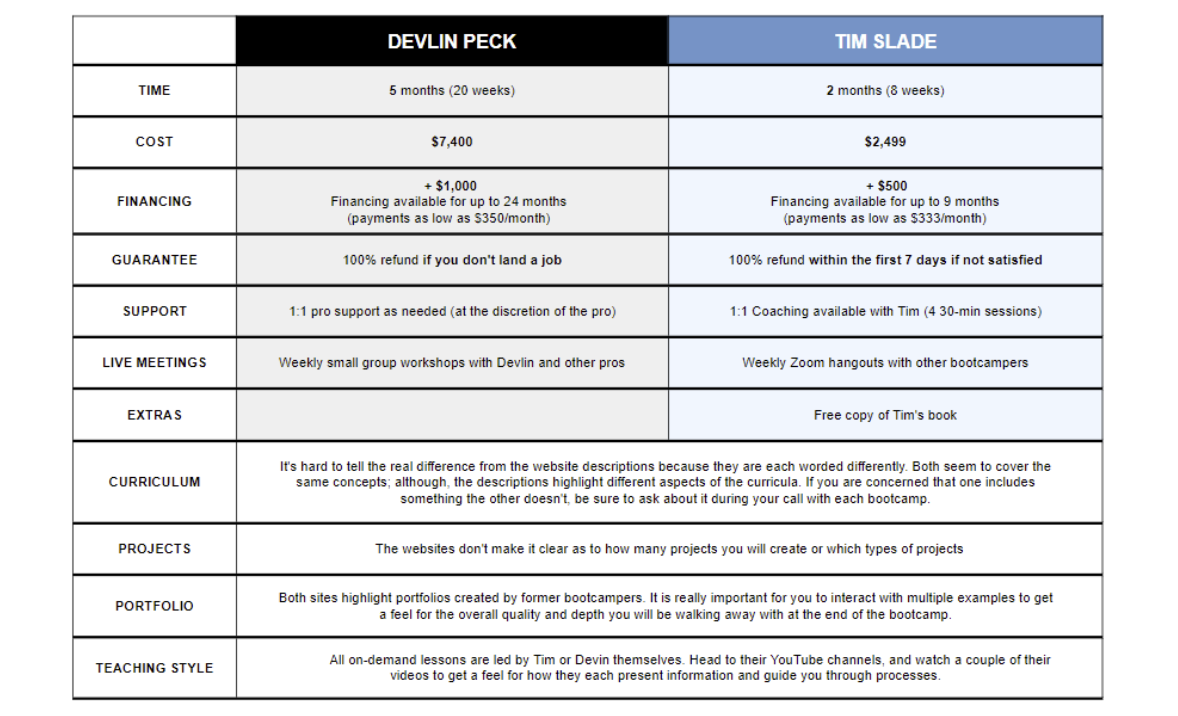CHOOSING A BOOTCAMP
I focused in on the bootcamp route because I didn’t have time or money for another college degree. I considered certification programs because I thought a certificate might carry more weight with potential employers. Just as with the software engineering credentials, my research seemed to point toward the fact that hiring managers aren’t really concerned with where an applicant got their skills. They are looking at your experience to see if it aligns with the position they are trying to fill and determine if it would be worth the company’s time and money to invite you to an interview. I looked into a number of certification programs, and I came to the conclusion that they were more “academic” than practical and hands-on. I was confident that the academic learning was something I could do on my own, and I really wanted a program that would help me to walk the walk as well as talk the talk. I needed to come out of it with a working portfolio ready for employers.
There are so many variables involved in finding the best fit for you, so you need to look at the details and weigh the pros and cons as they pertain to your personal situation.
Curriculum
Some bootcamps cover theory, ADDIE process, software, and projects in equal parts. Others put more emphasis on creating your portfolio. Find out what different types of projects will you be creating. Not all portfolios are created equal either. Be sure to look at sample portfolios from former bootcamp graduates. Besides your projects, what else will be highlighted in your portfolio?
Software
Which software will you gain experience with? In my experience, gaining expertise with Storyline 360 was far more beneficial than proficiency with several different programs. I learned Adobe Illustrator, Audition, Photoshop, Vyond, and Camtasia with a couple of YouTube tutorials each.
Total Cost
Tuitions I looked into ranged from around $3k - $9k. Most offer monthly payment plans, and some offer discounts for up-front payment in full. Some allow you to purchase individual courses from the bootcamp curriculum with the option to roll it into the bootcamp enrollment later if you decide you want to continue. There is more cost to consider beyond tuition. You will definitely need access to the software you will be using. Some bootcamps include access to the software in your tuition. That access is cut off upon completion of that module or possibly the bootcamp, and you won’t be able to get to your projects again if you haven’t already published them. Others leave it up to you to either purchase on your own or use free trials. None of them can guarantee you will walk right into a job upon completion, so I decided to purchase Articulate 360 for one year using my 50% teacher discount. It’s a good idea to add your personal email later so that you will be able to log in after you resign or retire from teaching.
Professional Support
How many people are currently enrolled in the bootcamp, and how many pros are providing support? What is the range of wait time for responses to your questions? Are there opportunities to ask live questions in small groups? What time zone are live events occurring? (SheCodes was based in Portugal, which made it extremely difficult for me to get answers to questions.) Most bootcamps are self-paced, but some may impose a time limit for each assignment from the time you begin. Some bootcamps have a rolling admission, and others have waves of enrollment.
Learn from the Experience of Others
Look up former bootcampers on LinkedIn. Message them to ask about their experiences. How long did it take them to complete the bootcamp? What do they wish had been included in their bootcamp experience? What do they wish they had known before enrolling in the bootcamp? Did they feel completely prepared for interviews? Have they been able to land a job? If so, how long did that take after completing the bootcamp?
Test It Out
Some bootcamps offer a free mini course for you to try out. Others have free lessons on YouTube. I highly recommend that you do a test run before signing on the dotted line. I’m not going to name all of the specific bootcamps here because, while I have opinions about each one, they are just that… opinions. As with every step in this transition, my experience and preferences may not be yours.
The first bootcamp I tested out was the one that was recommended most in the TCC community. The home page boasted that the average salary increase for their graduates was 62% over their current job. That really doesn’t mean much except that maybe a majority of their bootcampers were teachers with fewer than 10 years in the classroom, teachers working in daycares or other private situations, or recent college graduates. The next cohort wouldn’t start for another month, but I enrolled in their 5-day mini-course to get me started. The first thing I noticed in the mini-course was that all videos are narrated by the owner, and I wasn’t sure I could listen to her voice for an entire bootcamp. I couldn’t wait to create my mini-project, but I came to a screeching halt at the end of day 3. I was told to choose a “corporate-facing” topic for my project, but I had no idea what that would be. I reached out to the advisors on the course’s Facebook page, but all I got was a link to a website that generated corporate-facing topics. I just didn’t know where to start with any of them or how to turn a topic like effective communication into an incredibly brief outline template. It would have helped if I’d had some sample mini-projects. I asked if I could expect more guidance with choosing topics during the actual bootcamp, and the answer was no. All topics and content would be on me. I can only assume that there is more to it, but at this point, I was sure this wasn’t the right place for me.
The second bootcamp I explored also offered a 5-day mini-course. The first days covered basic adult learning theory and ADDIE. The rest of the week was more or less a perpetual sales pitch for the upcoming bootcamp session. I learned all about why the owner believed her bootcamp was far superior to the others. She also touted bootcamp modules you wouldn’t get in other bootcamps such as resume and interview guidance. However, I had already discovered 2 other bootcamps that covered resumes and interviews. There was pressure to enroll before the end of the 5 days in order to get a discount. The sales pressure made the hair on the back of my neck stand up. I spoke offline to others I met in the mini-course and learned that enrollment included a mandatory 3-page contract which included signing over all rights to your work to the bootcamp for promotional purposes.
The last two recommended bootcamps I tested out were Tim Slade’s The eLearning Designer’s Academy and Devlin Peck’s The Instructional Design Bootcamp. I strongly recommend you do your own research on these and any program you are considering. What follows here is my initial impression of each based on their respective websites.
My Decision
As I said earlier, there are so many variables that need to be factored into your decision. How much can you realistically invest in this process? How much time do you have to complete your transition? How much time per day and per week can you invest? This will look very different for someone with a busy family to take care of than it will for an empty nester (me). With all things considered, I chose Devlin Peck’s Instructional Design Bootcamp.
I certainly didn’t have the money to pay for either bootcamp in full, but I could squeeze out a $350 monthly payment. I knew that I would recoup the money as soon as I landed that new job.
Time-wise, I was pushing my luck with a 5-month bootcamp when my goal was to be employed in 5 months. However, since it was a self-paced program, I set my mind to do whatever it took to finish early.
Content weighed heavily in my decision. To be fair, I never scheduled a call with Tim Slade to verify my assumptions, and I would recommend scheduling a call with both. One of my assumptions was that, if they are both covering the same topics and end with an application-ready portfolio, a 5-month program would go into much more depth than a 2-month program. The sample portfolios were great from both camps, but I was most impressed with the focus on the scenario-based projects and in-depth process write-ups by Devlin Peck students.
The clincher for me was the 100% money-back guarantee that I would land a job after completing the bootcamp. If Devlin was willing to put his money where his mouth is, then I felt a lot more confident about this investment. Because of Devlin’s commitment to you actually landing a role, you will need to schedule a call with one of the bootcamp pros before you can enroll. To enroll in other bootcamps, all you need to do is submit an enrollment form with your financial commitment. Both Devlin and Tim vet their applicants first with a scheduled video call in order to determine if a person is a good fit for their programs. This is also an opportunity for applicants to ask all of their questions to be certain that the bootcamp is a good fit for you.
I met with Robbie Christian, one of the Devlin Peck bootcamp pros, for about 15-20 minutes. Robbie told me more about the bootcamp and answered my questions. At the end of the call, Robbie said he was confident that I was a match for The Instructional Design Bootcamp and if I wanted to move forward with it, he’d be happy to recommend my enrollment to Devlin. I started the very next day (March 21, 2023)!





